LATEST NEWS


You may have already heard that uber-retailer Walmart plans to open a 33,000 square-foot store in L.A.’s Chinatown.
Last week opponents of Walmart’s Chinatown store gathered at Sixth and Park View in MacArthur Park to listen to Walmart “associates”—the retailer’s preferred term for its employees—talk about their need for public assistance to make ends meet.
If you know L.A., you know MacArthur Park is nowhere near Chinatown. But it is across the street from a California Department of Public Social Services (DPSS) building—a place you’d go to apply for social services such as welfare and health care— for support you might need if you were employed at a poverty-wage job.
Support you might need if you work at Walmart.
There have been scores of news stories over the years about Walmart and the low job standards that rendered much of its workforce eligible for Medicaid.
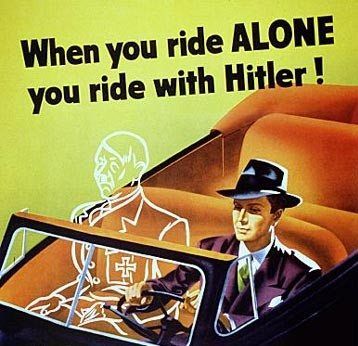

This weekend I was visiting one of the many free museums in Washington, D.C. (a perk of living in this city) and found an incredible poster at the National Museum of American History. Weimer Pursell’s color illustration depicted a well-dressed man behind the wheel of a 1940s convertible — with the ghostly outline of the Führer sitting next to him; it implored Americans to save gas during World War II by joining a car pool.
“When You Ride Alone You Ride With Hitler!” the letters scream. It is one of the war’s most famous posters and, while it has been copied and parodied since then, its message of national sacrifice resonates to this day.
Imagine that: During World War II Americans were told that riding alone in a car was like riding with Hitler. Saving and conserving, and helping others, was lifted up — in this and many other posters —
We drove north out of Santa Fe, through Espanola and past Abiquiu, the village where the artist Georgia O’Keefe lived, until we reached a narrow road in the high country. Then we drove until we came to a dirt and gravel road that led another 10 miles to a small cluster of houses and buildings named Ganado, the Spanish word for “cattle.” My wife, Susan, would live for a week at an encampment with a hundred other women, creating rituals and raising consciousness — while I headed back to Santa Fe with a stack of books.
But when I picked her up, she was not happy. The conference had been great, and the women amazing, but the noise had kept her mostly awake day and night. Just over the hillock someone was digging for natural gas, and by day the trucks rolled through and the drilling machines whined, and by night the pumps roared and the pipes rattled.
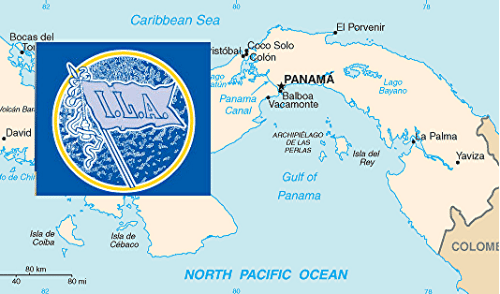
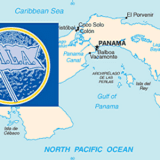
Not long ago, I wrote about how the goods-movement industry uses threats about the Panama Canal to try to keep costs low on the West Coast docks. “Diversion!” they shout. It’s a not-too-subtle threat to move cargo from the West Coast – where wages and environmental standards are high – to the East Coast.
Well, try not to get whiplash from the latest warning cries from these same folks. According to leading trade publication The Journal of Commerce, an executive from a shipping line is now warning of possible cargo diversion—from east to west! The International Longshoremen’s Association represents dock workers on the East and Gulf Coasts, and they’re currently negotiating a new contract. Making the bosses nervous is the fact that the ILA has a new, tough-talking leader.
The JOC reports: “David Arsenault, vice president of Hyundai Merchant Marine,
» Read more about: Shippers’ Panama Canal Threat: Real or Bluff? »

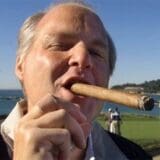
The Pentagon’s defiant pledge to stick with the Rush Limbaugh show, no matter what, bumps up against a few hard and insulting realities. The Armed Forces Network that carries the Limbaugh show is not a private business, corporation, or proprietorship that can do whatever it pleases with its money, personnel, operations and policy. Every penny of the armed forces bloated budget comes from taxpayers. The Armed Forces Network, which has beamed the Limbaugh show for two decades, is oiled to the tune of an estimated $27 million annually. Every penny of which comes from the pockets of taxpayers. And since the military is not a democracy, and decisions are made top down, there was never any chance that taxpayers would have any say about the use of their money to subsidize the naked bias of one radio jock at public expense.
The same rule applies to those in the military that have had Limbaugh shoved down their listening palate.
» Read more about: What Budget Cuts? Tax Dollars Promote Rush Limbaugh’s Show »
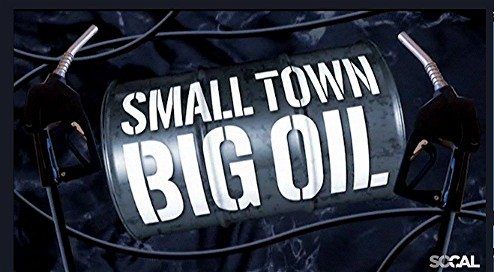

Last week KCET television broadcast “Small Town, Big Oil,” an examination of Chevron Oil’s influence on the L.A. County beach town of El Segundo. The station’s SoCal Connected show featured an interview by correspondent Vince Gonzales with Frying Pan News writer Donald Cohen, who had written about the recent Chevron controversy, in which El Segundo’s city manager, Doug Willmore, was fired for suggesting the petroleum giant pay a level of local taxes on par with other California refineries. Cohen is also the director of the Cry Wolf Project.
Click here for the full transcript. Here is a sample:
Gonzales: What is the message coming out of city government?
Donald Cohen/Director, Cry Wolf Project: The message is that Chevron is the sheriff. They are in control. They ought to be ashamed of themselves and so should the members of the Council who voted to fire the city manager.
» Read more about: Frying Pan Writer on KCET's Chevron Exposé »


International Women’s Day has been observed since the early 1900s, a time of great expansion and turbulence in the industrialized world that saw booming population growth and the rise of radical ideologies. While we have made great strides for women’s rights in the home, community and workplace over the past century, we still have a long way to go.
But does simply marking the day do much for women’s lives? Not really. We need to engage community leaders and push our decision-makers to enact policies that ensure we’re constantly moving forward.
In Los Angeles, we have many sectors that employ a large percentage of women, including the hospitality industry. These women work daily to ensure that the 27 million visitors who visit our city annually have a great experience. They make sure the rooms are spotless, the beds are made perfectly and guests are greeted warmly.
Judging by the numbers,
» Read more about: The Inhospitable World of L.A.’s Female Tourism Workers »


By Michele Reed
I am an in-home care worker and vice president of a union called United Long Term Care Workers (ULTCW), which is a member of the Service Employees International Union. Currently, I and over 120,000 other in-home caregivers are negotiating with Los Angeles County to win a living wage and better future for home-care workers. As testimony to the need for a living wage, here is my story.
Just over 19 years ago, I started taking care of my grandmother. She already had a home-care worker but I would help with errands, help around the house and just thought to myself that after all she had done for me, this was the least I could do for her. From the moment I started taking care of her, I knew that home care was my calling.
Growing up, I was an only child and my mother was an only child too.
» Read more about: A Living Wage: Making a Difference for Caregivers »
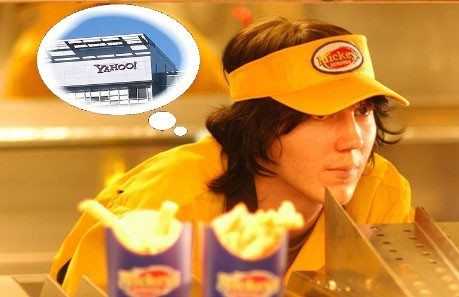

During his 20-year career as a journalist, Rick Wartzman delved deep into the reality of poverty for a major Wall Street Journal examination of the minimum wage and also mastered the intricacies of corporate finance as business editor of the L.A. Times. In yesterday’s interview with Frying Pan News, the executive director of the Drucker Institute discussed the destructive force of big business’ “shareholder-is-all culture.” In today’s conclusion, Wartzman talks about Walmart, the outlook for unions and the need to build an education-based service economy.
Frying Pan News: How would you characterize Walmart, which is now trying to move into L.A.’s grocery market?
Rick Wartzman: Walmart is less Drucker-like than Costco, certainly, but increasingly presents a complicated picture. They’ve always paid lousy wages and benefits, squeezed suppliers until they choked and accelerated the race to the bottom in terms of low-cost labor.
» Read more about: Interview: Rick Wartzman on Greed and Conscious Capitalism, Part 2 »
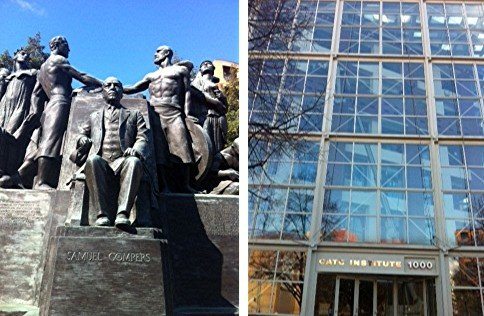
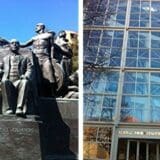
What do 19th century labor leader Samuel Gompers and the virulently anti-union think tank, the Cato Institute, have in common? More than you might imagine. They actually stare out at each other across Massachusetts Avenue in Washington, D.C. Or rather, the beautiful monument of Gompers and Gompers Square sit directly opposite Cato’s towering, modern offices, where the Koch brothers regularly plot strategy.
I discovered this humorous anomaly while moving into my temporary apartment around the corner, on 11th Street and Massachusetts Avenue, as I prepared to begin a three-month fellowship at Georgetown University — and a project that will look at ways to link to federal policy our efforts to build a new economy for all in Los Angeles. More on that later.
In memory of Gompers, I decided to create an imagined dialogue between the Cato Institute — now embroiled in an internal brouhaha involving the Brothers Koch – and their ever present bronze nemesis,


Few can claim as much knowledge of both sides of America’s polarized wealth divide as Rick Wartzman. During his 20-year career as a journalist, Wartzman delved deep into the reality of poverty for a major Wall Street Journal examination of the minimum wage and also mastered the intricacies of corporate finance as business editor of the L.A. Times. At the Times he also originated one of the paper’s only serious attempts at understanding the real economic challenges of our time, a column that the Times soon jettisoned, making clear that covering the lives of the working class — truck drivers, hotel workers, factory hands — was not a priority.
Since 2007 Wartzman has served as executive director of the Drucker Institute, a think tank founded to perpetuate the legacy of management guru Peter Drucker and dedicated to bettering society by helping organizations to be more effective and responsible.
» Read more about: Drucker Institute’s Rick Wartzman on Greed and Conscious Capitalism »


Since when did one’s mode of transportation become about politics? Who ever thought that riding one’s bike to the grocery store, taking the bus to work or driving to run errands could be a sign of one’s political stripes?
In some cities, such as New York and San Francisco, riding the train defines the experience of everyone living there. Entire movies, books and blogs have documented the romance and day-to-day life of riding public transit and navigating busy sidewalks. Can you even imagine what a New York free of subways, buses and pedestrians would look like? Republican or Democrat, liberal or conservative, you’re on the train.
Just ask Mitt.
Mitt Romney is among a vocal set of Republicans who have decided that certain forms of transportation are more democratic than others; he subscribes to the belief that roads are a given right of Americans, but that public transit is not.
» Read more about: Highway Robbery: Mitt Romney’s War on Mass Transit »


Happy Birthday, Walmart! You great big mega-marketing rascal–you turn 50 this week. You’ve come such a long way from Roger, Arkansas, the tiny town at the foot of the Ozarks where you took your first wobbly steps.
Now you’re an international star! The planet’s biggest private-sector employer, with 2.2 million “associates” throughout the world—we usually call ‘em employees, but whatever– 1.4 million in the United States. Creator of history’s most efficient global supply chain, you call the shots on production, wage and workplace standards around the world—the Walmart business model ruthlessly undercut those everywhere. Plus you have shriveled and destroyed small business communities in towns across the United States.
Star power, dudes.
Now you are here in Los Angeles celebrating the big Five Oh with a new acquisition.
It’s tasteful, not large and gaudy, like your typical 200,000 square foot megastore.
» Read more about: Grand Illusion: Walmart's Birthday "Gift" to Chinatown »
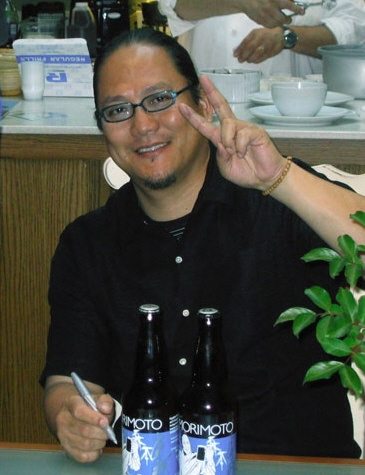

I’m going to hate writing this. Every word.
Last week Masaharu Morimoto of Iron Chef fame was outed by my union, UNITE HERE, Local 11 as being in talks with the Hyatt Andaz hotel to take over the RH restaurant, where I work as a server.
I first became aware of the news when I arrived at a large picket in front of the Hyatt Andaz. The action was two days before Valentine’s Day. I was late to the picket because, as noted in an earlier column, I had to drive my mother-in-law to Walmart — which still pains me to admit.
The action in front of my hotel, like many before, was about protesting current work and safety conditions. It was co-sponsored by OUT and OCCUPY, which is a LGBTQ organization that has been unified with UNITE HERE Local 11 in making sure that all workers,


Frying Pan News writer Donald Cohen appears on television tonight in a segment of KCET’s SoCal Connected to discuss El Segundo’s alleged sweetheart tax deal with the Chevron oil corporation, whose local refinery has long dominated the town’s commerce and politics.
The case became a scandal when El Segundo’s city manager, Doug Willmore, was sacked after he purportedly dug up details of a 1994 agreement between Chevron and city officials that codified the company’s low tax payments in perpetuity.
The Channel 28 program, “Small Town, Big Oil,” airs 9 p.m. Friday, with repeat showings scheduled for the following week . Click here to see entire episode.
» Read more about: Spotlight on El Segundo's Oil-Tax Controversy »

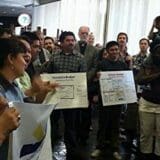
Long Beach hospitality workers are one step closer to better wages. After years of trying to improve conditions in the hotel industry, members of the Long Beach Coalition for Good Jobs and a Healthy Community filed paperwork to place a citywide measure on the November ballot that would require hotels to pay hospitality workers a living wage.
The living wage measure would affect hotels with more than 100 rooms, requiring them to pay workers $13 an hour. Research from past living wage victories in areas such as Los Angeles’ Century Boulevard has estimated that workers reinvest over two-thirds of their increased income back into the local community. Higher hotel wages in Long Beach would not only lift families out of poverty, but would spark a much-needed reinvestment in the city’s local businesses and neighborhoods.
A recent story and video in the Long Beach Press Telegram captures the kickoff to this historic campaign.


If you’re a woman, an artist, a cancer survivor or patient; someone with a connection to the Holocaust or the 1960s women’s movement — in fact, if you’re anyone who wonders how we human beings can endure indescribable suffering and come out the other end with something to say about it – you must see Alina Szapocznikow, Sculpture Undone at the Hammer museum before it closes April 30th. I fit a number of those categories and was deeply moved to find such connections with the work.
At the beginning of the exhibit you meet the artist (who died in 1973 at the age of 47) in a rough video. She’s young and lively and seems so innocent. When the thick-headed interviewer asks about her experiences as a young girl in a Nazi concentration camp, Szapocznikow responds with “it would be immodest to discuss my own suffering.” When the same off-screen voice asks her to describe what it’s like to be a woman in 1960s Poland,
» Read more about: The Body Reconsidered: The Art of Alina Szapocznikow »
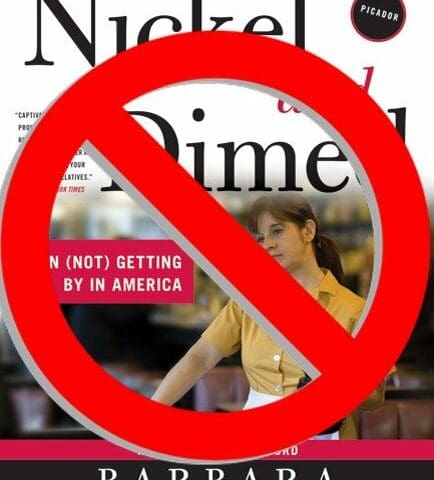
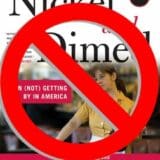
As an author, my place on bookshelves is precarious. You can have your book banned in this country for any number of reasons. Schools especially might find a book profane or inappropriate. Or, as in the case of J.R.R. Tolkien’s The Lord of the Rings, your work might be thrown into the pyre for being “satanic.”
None of this surprises me. This does: Barbara Ehrenreich’s well-received 2001 book Nickel and Dimed was removed from a personal finance class in Bedford, N.H., for being “anti-capitalist.”
Seriously.
Nickel and Dimed chronicles Ehrenreich’s quest to explore our economy from the perspective of an “unskilled” worker. Propelled into her social experiment by the debate over welfare, she moved across the country, taking the cheapest lodgings and whatever work she could find, from clerk to hotel maid. The result sheds light on the experience of what it means to survive on poverty-level wages in the U.S.
» Read more about: Banned in America: The Truth About Poverty »
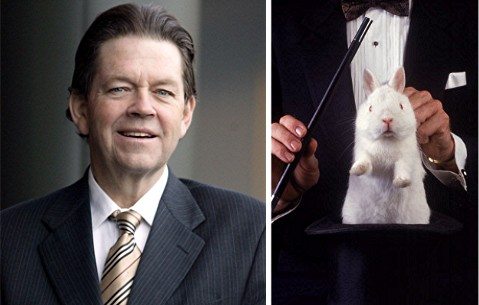

One of our favorite pastimes at Frying Pan News is exploding those irritating little factoids the Right likes to use to make its case for some policy or another. Myths like the Welfare Queen, or overpaid public employees, or the perennial American classic about bootstraps. (Since it seems that so many of these fraught conversations take place at family gatherings, we often call them “brother-in-law conversations.”)
Just in time for tax season, a new myth has been making the rounds: that states with no income tax fare better, economically, than other states. This notion is most associated with Arthur Laffer, the voodoo economist, but it has been amplified by, among others, ALEC (American Legislative Exchange Council) and the Wall Street Journal. Unsurprisingly, state politicians have taken up the call: In the name of spurring growth,
» Read more about: Taxing Logic: One Revenue-Cutting Trick Is a Real Laffer »

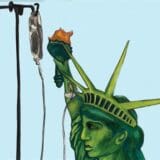
By Richard Kirsch
(In the following excerpt from his new book, Fighting for Our Health, Roosevelt Institute Senior Fellow Richard Kirsch notes that many small business owners support health care reform even if the organizations that claim to speak for them don’t. Used by permission.)
Small business is iconic in America. For years, big business has cleverly used small businesses to be messengers for campaigns financed by corporate America. And anti-government, free-market orthodoxy has dictated the policies of the leading small business associations, including the National Federation of Independent Businesses (NFIB). A powerful example of NFIB clout was the key role that the association played in defeating the Clinton health care plan. If we needed any reminder of that, President Obama asked the heads of just two lobbying groups, the NFIB and the health insurance industry, to speak at the White House health summit held shortly after his inauguration.
» Read more about: Success Costs Small Business Owner His Health Insurance »